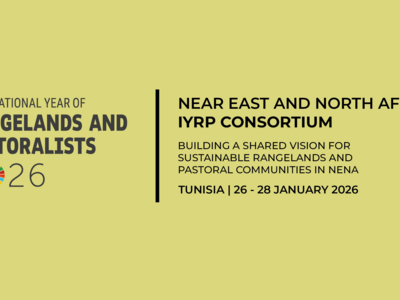Qualitative and quantitative methodologies for the assessment of rangeland governance
3-5 December. Tunis. Training on: “Qualitative and quantitative methodologies for the assessment of rangeland governance”. Jointly organized by ICARDA & IRA Médenine.
This training in organised in the framework of the Consortium Research Program (CRP) on “Policies, Institutions and Markets” (PIM), led by IFPRI and coordinated by ICARDA in the North African region. CRP PIM leads action-oriented research for a food-secure future. Its research portfolio provides support for policies that help poor farmers, both men and women, improve their lives; produce nutritious and affordable foods; and protect the soil, water, and biodiversity in rural landscapes.
An important flagship of CRP PIM is related to “Governance of Natural Resources” which aims at Facilitating shared use of resources within landscapes, among others. In the framework of this flagship, ICARDA and IRA were undertaking some background research on rangeland governance under different land tenure systems in South Tunisia.
The research teams of ICARDA and IRA consolidated and tested a good set of approaches and tools for the qualitative and quantitative assessment of rangeland governance, which will be shared with researchers and other practitioners in the framework of this training.
Objectives
The training aims at enhancing the capacity of national researchers and practitioners, working in the field of rangeland and resource management to conduct comprehensive research related to governance assessment, analysis, and characterisation. Participants will be trained on a set of statistical tools, such as Bayesian networks, and qualitative methods, such as MACTOR, with application to governance assessment.
Summary program:
Day 1
- Presentation of theoretical framework for governance analysis: “Rangeland socio-ecological systems” & “Institutional Analysis and decomposition of rangeland institutions”.
- Hands on session on the MACTOR tool ▪ Assessment of some governance aspects using MACTOR. ▪ Installation and first presentation of the MACTOR tool
Day 2
- Hands on session on the MACTOR tool ▪ Exercise 1: Simulation stakeholders influence, alliances, and conflicts. ▪ Exercise 2: reading and discussing the output files.
- Assessment of Social Networks using the SNA approach ▪ Exercice 3: Installation and use of the Gephi Software for the analysis of social networks and influences in resources management (case of rangelands)
Day 3
- Assessment of causality relations in rangeland socio-ecological systems. ▪ Exercise 4: Installation of NETICA software. Data organisation and entry for NETICA ▪ Exercise 5: Using NETICA to represent causal relations within rangeland SES. ▪ Reading and interpreting the results.

